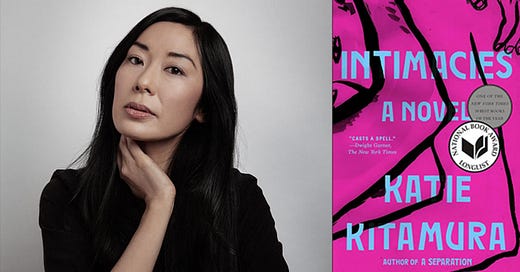Who we are, who we might have been, or might yet be, and how we translate ourselves to others, may be the presiding question of our existence. None of us is immune to self-doubt or ambivalence, the heart of Katie Kitamura’s fascinating trilogy: A SEPARATION, INTIMACIES, and AUDITION.
Not a trilogy as a series – no interconnected plotlines or characters, and not sequential. These short novels [merely 800 pages in total] comprise a trilogy of self-reflection via different characters exhibiting similar character traits and challenges. A study of internal conflict more than external. Staccato description. Pointed dialogue. A narrative which, although told in first person, feels once removed, as if viewed through a long-focus lens. Cool, is what some critics say, but in this style, Kitamura invites us in as witness, so that we form our own conclusion.
Once again, as in the writings of fellow modernists like Rachel Kushner, Sally Rooney, Patricia Lockwood, et al, of whom I’ve written before, do not expect plot. Certainly not traditional story structure. Kitamura sets scenes with only sufficient detail to establish context. Introduce character. Establish the mystery [and there is mystery in all three.] What narrative arc there is, subtly rendered, certainly not linear.
So, of you like to spend reading time with a contemplative narrator and wonder, as hers do, how we interpret what we feel, and the resulting impact of our behavior on those in our immediate orbit, read the three. And, as the trilogy’s thematic builds, I suggest reading in order.
The emulation became the thing itself, in the end there was not that much difference between the grief of a wife and the grief of an ex-wife – perhaps wife and husband and marriage itself are only words that conceal much more unstable realities, more turbulent than can be contained in a handful of syllables, or any amount of writing. A SEPARATION
A SEPARATION: When an ex-husband goes missing, and as he’s asked his wife, a translator, to keep their separation a secret, she must travel to Greece to unravel the mystery. Along the way, of course, her marriage becomes the subject of her musings, and the question of how well we recognize or understand our own role in a committed relationship becomes the prevailing question. Spoiler alert: Unlike Agatha Christie or a BBC series, we don’t always catch the bad actor and much is left to the imagination.
Why else would a woman follow her estranged husband to another country other than to bring an end to their separation? It was an extravagant gesture and extravagant gestures between a man and a woman are generally understood to be romantic, even in the context of a failed marriage.
In effect, this narrator’s entire existence has been a bifurcation of self, which sets up the ambivalence characterizing all the protagonists in the trilogy. We are not always the sum of our parts. Thus, the ambiguity as well.
…I wanted to pretend that it was as I had led everyone to believe, that there was no separation, no disintegration of our marriage, no pending divorce. It was the desire to continue to exist in the space – suddenly and inexplicably alive – of our marriage.
There were great chasms beneath words, between two or sometimes more languages, that could open up without warning. As interpreters it was our job to throw down planks across these gaps. INTIMACIES
INTIMACIES: This narrator, an interpreter at the international criminal court and new to The Hague, finds herself caught up in the complex backstory of a war criminal on trial. In an effort to avoid judgement, she seems trapped, perhaps purposefully, into a vortex of confusion. As if she has been sucked into a different destiny. This character struggles with the challenge of translation on a grander scale – how do we sympathize or engage with others who are also divided selves? Inevitably, questioning everything she thought she knew, she becomes a false witness to her own life.
I want to be in a place that feels like home. Where that was, I did not know. It is surprisingly easy to forget what you have witnesses, the horrifying image or the voice speaking the unspeakable, in order to exist in the world we must and we do forget, we live in a state of I know but I do not know.
Kitamura reminds us that when we are not grounded in ourselves, we cannot be truly intimate with others. And, in this case, too easily drawn into the confusion and desperation around us.
It was that here, that the gap between my private and performed selves collapsed and for the briefest of moments there was only a single undivided self.
In the end, what is a relationship but two people, and between two people there will always be room for surprises and misapprehensions, things that cannot be explained. Perhaps another way of putting it is that between two people there will always be room for failures of imagination. AUDITION
AUDITION: Much is said of late about our western culture being performative, transactional, and Kitamura’s characters exemplify this. A translator, an interpreter, and, in this, the final novel, an stage actress. Who better tasked with the pretense of a totally different persona? A persona that, in fact, shifts from performance to performance. Actors are translators, interpreters, and always, in effect, auditioning, to the audience as well as intimate partners. Performative and transactional.
There are always two stories taking place at once… the narrative inside the play and the narrative around it, and the boundary between the two is more porous than you might think, that is both the danger and the excitement of performance.
What all three novels have in common, beyond mystery and self-examination, is the deliberation of marriage and family, particularly here. Kitamura probes the meaning, and potential, of the ties that bind. Protagonists are either separated or on their way, engaging in alternative relationships, sanctioned or otherwise. In AUDITION, which takes a surprising and, at first, confusing, and fascinating turn midway, the deliberation of an entirely alternate life. The play, and the part, rewritten.
Because in fact, we don’t want to see the thing itself, on a screen or on a stage, we don’t want to see the actual pain or suffering or death, but its representation.
Which of the actress’s personas has better fulfilled her destiny, Kitamura seems to ask. Who has been the more accomplished performer? What will it take to ground a life?
It was banal, indisputably bourgeois, the coffee cups and the stupid pastries – but that was almost the point. To return to that ordinary life, with its coziness and safety, all those things that are so easy to despise and dismiss. In those rituals of daily life, I committed myself to the marriage, in all its mundanity, all over again. At least, for a time.
INTIMACIES, for me, was the best of the trilogy, the more layered fiction, although all supremely fine reading and suiting the current culture. All three read together would serve as a fascinating book group discussion.
Cheers.






I enjoyed your approach of offering quoted passages followed by ruminations on them and the greater story. You caught essential themes by it. And I agree -- the three together would make for great book club discussion!